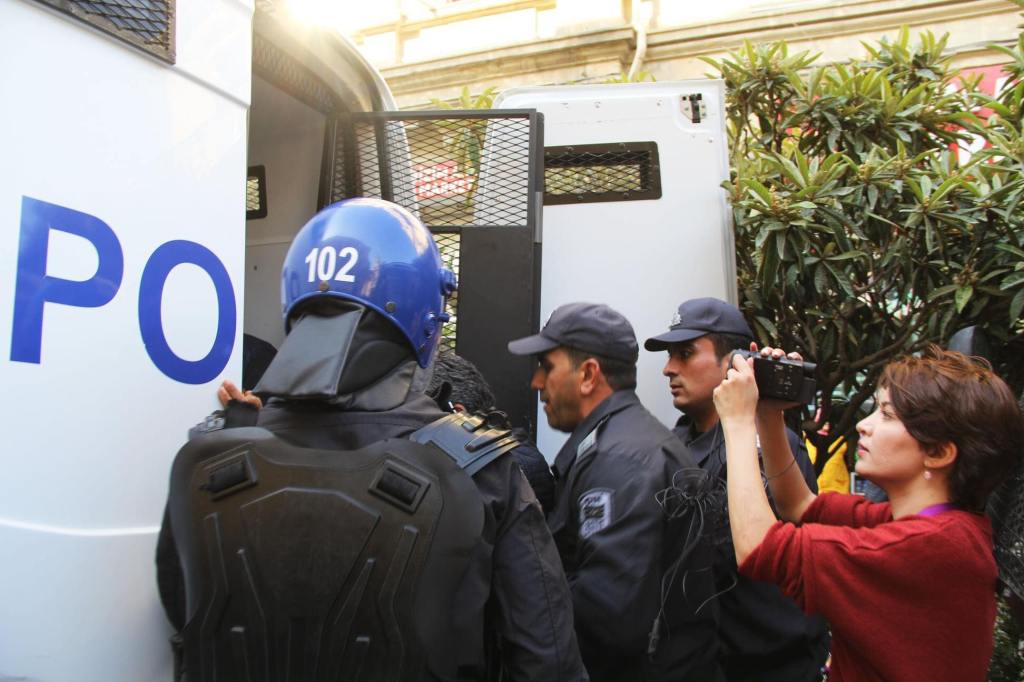Azerbaijani authorities have long had a firm grip on the media by imprisoning, harassing, and persecuting journalists both at home and abroad as well as blocking their websites. Now authorities are alleged to have used a new tool in their quest to muzzle independent reporting: spyware. Several Azerbaijani journalists have been named in the collaborative investigation Pegasus Project as possible targets of Pegasus spyware produced by the Israeli company NSO Group.
Sevinj Vagifgizi, a correspondent for the Berlin-based, Azerbaijan-focused independent media outlet Meydan TV, was targeted by Pegasus from 2019 to 2021, according to the international network Organized Crime and Corruption Reporting Project (OCCRP), which analyzed Vagifgizi’s phone. Meydan TV is a member of the OCCRP.
According to the OCCRP, the journalist was previously in Azerbaijani authorities’ crosshairs. She was banned from leaving the country from 2015 to 2019 after authorities told her Meydan TV was under investigation in a criminal case, and in 2019 she faced libel charges after she reported on people voting with government-issued prefilled ballots.
Vagifgizi spoke to CPJ via phone about her experience of being hacked from Berlin, where she is currently based as part of Time Out and Research Scholarship program of Reporters Without Borders Germany.
CPJ send an email request to NSO Group for comment for this piece but did not receive a reply. In a rebuttal published online, the company said the Pegasus Project’s allegations were false. The company has told CPJ that it will “investigate credible claims of misuse” and that it vets its clients. CPJ also requested comment from Azerbaijan’s state security service via its website, but it was not returned.
Her answers were edited for length and clarity.
How did you find out you were surveilled?
In June, my colleagues from the Organized Crime and Corruption Reporting Project contacted me and said that we should meet. They came to Berlin. During the meeting, they said: “We have bad news for you, we should take your phone because we have information that the government bugged your phone.” After they checked my phone, they told me that my phone had been targeted with the Pegasus program since 2019. They said with this program, [the Azerbaijani authorities] could listen and record all audio and video, including private videos and photos, get all the information about my contacts, and have access to all my text and voice messages. I was also told that they knew my location at any point in time.
How did you feel at that moment? What were your main concerns?
I was astonished, I felt awful. I was always aware that the [Azerbaijani] security service listens to our phone calls, but I never imagined that they could access anything through the internet and can record voices and take videos, and listen to and read everything I write or say.
I was concerned about my sources who didn’t want the authorities to know that they were in touch with me. I was also concerned about my colleagues who didn’t want the authorities to know about them because if the authorities find out who they are, it may cause problems for them.
You are currently in Berlin but are set to return to Baku in late August. Are you concerned about going back to Azerbaijan?
My main concern is that the authorities will bar me from traveling abroad again. I was under a travel ban for four years, from 2015 through 2019. I went through all appeal stages [in Azerbaijan] and then went to the European Court of Human Rights. The European Court ruled that the travel ban was unlawful, and the [Azerbaijani] government paid me a compensation and lifted the travel ban in 2019. I was able to come to Berlin this spring because I am not barred from leaving Azerbaijan anymore. I am concerned that the ban may return. I am also worried that now the authorities know who works with Meydan TV [because of the surveillance] and may bar them from leaving Azerbaijan too.
Do you know what triggered the surveillance? Was it a specific investigation or your work in general?
I’ve worked as a journalist since 2010. Before joining Meydan TV, I also worked with independent newspaper Azadliq. I have reported on social issues and human rights violations. I often covered political prisoners’ plights. I also did an investigation for OCCRP on [alleged] official corruption in Azerbaijan. But the time they bugged my phone coincided with the lifting of my travel ban.
Do you know which government agency may have procured the Pegasus spyware to hack your phone?
I don’t have any exact information on that but my colleagues and I assume it’s the state security service of Azerbaijan.
How would authorities have gotten ahold of your number?
It’s easy to find my number because as a journalist I contact a lot of people. Many people want to talk to me, tell me about their problems, so I can prepare reports on those issues as a journalist. Therefore they have or can easily find my number. Other journalists, including those who work for state media outlets, also have my contacts. So, it wasn’t hard.
What is next for you? What do you want to do about the surveillance?
We are going to take the case to an [Azerbaijani] court. We want to find out what explanation the Azerbaijani government can offer for targeting us. We are determined to go to the European Court [of Human Rights] too.
As a journalist, I am determined to continue my work because people need us, because people don’t have [many] sources to get truthful information about the real situation in the country. My colleagues and I will keep working. I know that the government will continue surveilling us, but they won’t stop us.
[Editors’ Note: The text of the 13th paragraph has been updated to correct Vagifgizi‘s concern regarding how surveillance may affect people who work with Meydan TV.]
